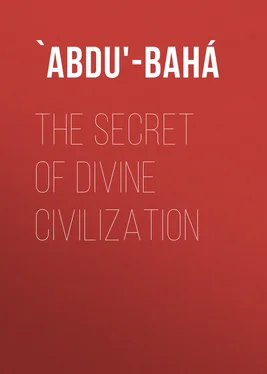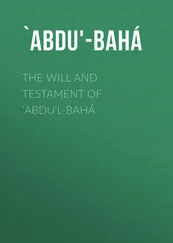`Abdu'-Bahá - The Secret of Divine Civilization
Здесь есть возможность читать онлайн «`Abdu'-Bahá - The Secret of Divine Civilization» — ознакомительный отрывок электронной книги совершенно бесплатно, а после прочтения отрывка купить полную версию. В некоторых случаях можно слушать аудио, скачать через торрент в формате fb2 и присутствует краткое содержание. Издательство: Иностранный паблик, Жанр: foreign_prose, foreign_religion, Философия, foreign_psychology, foreign_antique, на английском языке. Описание произведения, (предисловие) а так же отзывы посетителей доступны на портале библиотеки ЛибКат.
- Название:The Secret of Divine Civilization
- Автор:
- Издательство:Иностранный паблик
- Жанр:
- Год:неизвестен
- ISBN:нет данных
- Рейтинг книги:5 / 5. Голосов: 1
-
Избранное:Добавить в избранное
- Отзывы:
-
Ваша оценка:
- 100
- 1
- 2
- 3
- 4
- 5
The Secret of Divine Civilization: краткое содержание, описание и аннотация
Предлагаем к чтению аннотацию, описание, краткое содержание или предисловие (зависит от того, что написал сам автор книги «The Secret of Divine Civilization»). Если вы не нашли необходимую информацию о книге — напишите в комментариях, мы постараемся отыскать её.
The Secret of Divine Civilization — читать онлайн ознакомительный отрывок
Ниже представлен текст книги, разбитый по страницам. Система сохранения места последней прочитанной страницы, позволяет с удобством читать онлайн бесплатно книгу «The Secret of Divine Civilization», без необходимости каждый раз заново искать на чём Вы остановились. Поставьте закладку, и сможете в любой момент перейти на страницу, на которой закончили чтение.
Интервал:
Закладка:
The purpose of the foregoing statements is to demonstrate at least this, that the happiness and greatness, the rank and station, the pleasure and peace, of an individual have never consisted in his personal wealth, but rather in his excellent character, his high resolve, the breadth of his learning, and his ability to solve difficult problems. How well has it been said: “On my back is a garment which, were it sold for a penny, that penny would be worth far more; yet within the garment is a soul which, if you weighed it against all the souls in the world, would prove greater and nobler.”
In the present writer’s view it would be preferable if the election of nonpermanent members of consultative assemblies in sovereign states should be dependent on the will and choice of the people. For elected representatives will on this account be somewhat inclined to exercise justice, lest their reputation suffer and they fall into disfavor with the public.
It should not be imagined that the writer’s earlier remarks constitute a denunciation of wealth or a commendation of poverty. Wealth is praiseworthy in the highest degree, if it is acquired by an individual’s own efforts and the grace of God, in commerce, agriculture, art and industry, and if it be expended for philanthropic purposes. Above all, if a judicious and resourceful individual should initiate measures which would universally enrich the masses of the people, there could be no undertaking greater than this, and it would rank in the sight of God as the supreme achievement, for such a benefactor would supply the needs and insure the comfort and well-being of a great multitude. Wealth is most commendable, provided the entire population is wealthy. If, however, a few have inordinate riches while the rest are impoverished, and no fruit or benefit accrues from that wealth, then it is only a liability to its possessor. If, on the other hand, it is expended for the promotion of knowledge, the founding of elementary and other schools, the encouragement of art and industry, the training of orphans and the poor—in brief, if it is dedicated to the welfare of society—its possessor will stand out before God and man as the most excellent of all who live on earth and will be accounted as one of the people of paradise.
As to those who maintain that the inauguration of reforms and the setting up of powerful institutions would in reality be at variance with the good pleasure of God and would contravene the laws of the Divine Law-Giver and run counter to basic religious principles and to the ways of the Prophet—let them consider how this could be the case. Would such reforms contravene the religious law because they would be acquired from foreigners and would therefore cause us to be as they are, since “He who imitates a people is one of them”? In the first place these matters relate to the temporal and material apparatus of civilization, the implements of science, the adjuncts of progress in the professions and the arts, and the orderly conduct of government. They have nothing whatever to do with the problems of the spirit and the complex realities of religious doctrine. If it be objected that even where material affairs are concerned foreign importations are inadmissible, such an argument would only establish the ignorance and absurdity of its proponents. Have they forgotten the celebrated hadí th(Holy Tradition): “Seek after knowledge, even unto China”? It is certain that the people of China were, in the sight of God, among the most rejected of men, because they worshiped idols and were unmindful of the omniscient Lord. The Europeans are at least “Peoples of the Book,” and believers in God and specifically referred to in the sacred verse, “Thou shalt certainly find those to be nearest in affection to the believers, who say, ‘We are Christians.’” 13 13 Qur’án 5:85.
It is therefore quite permissible and indeed more appropriate to acquire knowledge from Christian countries. How could seeking after knowledge among the heathen be acceptable to God, and seeking it among the People of the Book be repugnant to Him?
Furthermore, in the Battle of the Confederates, Abú Súfyán enlisted the aid of the Baní Kinánih, the Baní Qahtán and the Jewish Baní Qurayzih and rose up with all the tribes of the Quray shto put out the Divine Light that flamed in the lamp of Ya thrib (Medina). In those days the great winds of trials and tribulations were blowing from every direction, as it is written: “Do men think when they say ‘We believe’ they shall be let alone and not be put to proof?” 14 14 Qur’án 29:2.
The believers were few and the enemy attacking in force, seeking to blot out the new-risen Sun of Truth with the dust of oppression and tyranny. Then Salmán (the Persian) came into the presence of the Prophet—the Dawning-Point of revelation, the Focus of the endless splendors of grace—and he said that in Persia to protect themselves from an encroaching host they would dig a moat or trench about their lands, and that this had proved a highly efficient safeguard against surprise attacks. Did that Wellspring of universal wisdom, that Mine of divine knowledge say in reply that this was a custom current among idolatrous, fire-worshiping Magians and could therefore hardly be adopted by monotheists? Or did He rather immediately direct His followers to set about digging a trench? He even, in His Own blessed person, took hold of the tools and went to work beside them.
It is moreover a matter of record in the books of the various Islamic schools and the writings of leading divines and historians, that after the Light of the World had risen over Ḥijáz, flooding all mankind with Its brilliance, and creating through the revelation of a new divine Law, new principles and institutions, a fundamental change throughout the world—holy laws were revealed which in some cases conformed to the practices of the Days of Ignorance. 15 15 Jáhilíyyih: the period of paganism in Arabia, prior to the advent of Muḥammad.
Among these, Muḥammad respected the months of religious truce, 16 16 The pagan Arabs observed one separate and three consecutive months of truce, during which period pilgrimages were made to Mecca, and fairs, poetry contests and similar events took place.
retained the prohibition of swine’s flesh, continued the use of the lunar calendar and the names of the months and so on. There is a considerable number of such laws specifically enumerated in the texts:
“The people of the Days of Ignorance engaged in many practices which the Law of Islám later confirmed. They would not take in marriage both a mother and her daughter, and the most shameful of acts in their view was to marry two sisters. They would stigmatize a man marrying the wife of his father, derisively calling him his father’s competitor. It was their custom to go on pilgrimage to the House at Mecca, where they would perform the ceremonies of visitation, putting on the pilgrim’s dress, practicing the circumambulation, running between the hills, pausing at all the stopping-places, and casting the stones. It was, furthermore, their wont to intercalate one month in every three-year period, to perform ablutions after intercourse, to rinse out the mouth and snuff up water through the nostrils, to part the hair, use the tooth-stick, pare the nails and pluck the armpits. They would, likewise, cut off the right hand of a thief.”
Can one, God forbid, assume that because some of the divine laws resemble the practices of the Days of Ignorance, the customs of a people abhorred by all nations, it follows that there is a defect in these laws? Or can one, God forbid, imagine that the Omnipotent Lord was moved to comply with the opinions of the heathen? The divine wisdom takes many forms. Would it have been impossible for Muḥammad to reveal a Law which bore no resemblance whatever to any practice current in the Days of Ignorance? Rather, the purpose of His consummate wisdom was to free the people from the chains of fanaticism which had bound them hand and foot, and to forestall those very objections which today confuse the mind and trouble the conscience of the simple and helpless.
Читать дальшеИнтервал:
Закладка:
Похожие книги на «The Secret of Divine Civilization»
Представляем Вашему вниманию похожие книги на «The Secret of Divine Civilization» списком для выбора. Мы отобрали схожую по названию и смыслу литературу в надежде предоставить читателям больше вариантов отыскать новые, интересные, ещё непрочитанные произведения.
Обсуждение, отзывы о книге «The Secret of Divine Civilization» и просто собственные мнения читателей. Оставьте ваши комментарии, напишите, что Вы думаете о произведении, его смысле или главных героях. Укажите что конкретно понравилось, а что нет, и почему Вы так считаете.












